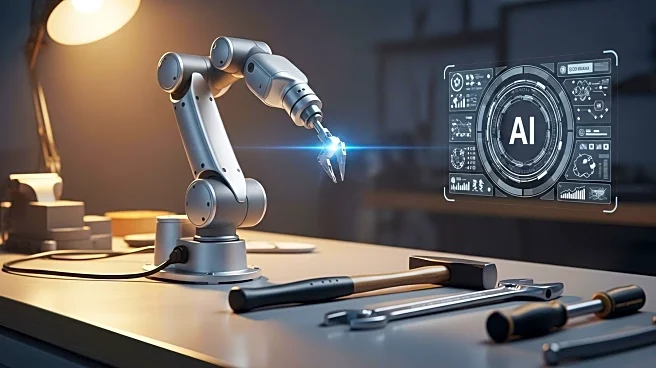What is the story about?
What's Happening?
The rise of artificial intelligence is influencing young Americans to pursue careers in skilled trades, as traditional white-collar jobs face automation threats. According to a survey by ResumeBuilder.com, 42% of Gen Zers are working in or pursuing blue-collar jobs such as electricians, plumbers, and welders. High tuition costs and the perceived security of trades against automation are significant factors driving this shift. Jacob Palmer, a young entrepreneur, exemplifies this trend by successfully running his own electrical company, Palmer Electrical, without a college degree. The trades are increasingly seen as viable career paths, with school districts reporting heightened interest in programs like welding and auto shop.
Why It's Important?
This shift towards skilled trades has broad implications for the U.S. labor market and education system. As AI continues to automate entry-level white-collar jobs, the demand for skilled tradespeople is expected to rise, potentially alleviating labor shortages in sectors like construction and manufacturing. This trend could reshape educational priorities, emphasizing vocational training over traditional college pathways. Businesses in the trades may benefit from a larger pool of young, motivated workers, while industries reliant on white-collar jobs may need to adapt to a changing workforce landscape. The economic impact includes potential growth in sectors less susceptible to automation.
What's Next?
As more young Americans opt for skilled trades, educational institutions may expand vocational programs to meet demand. Companies in the trades could see increased competition for skilled workers, prompting higher wages and improved working conditions. Policymakers might focus on supporting vocational education and addressing labor shortages in critical sectors. The ongoing evolution of AI technology will continue to influence job security perceptions, potentially driving further shifts in career choices among younger generations.
Beyond the Headlines
The cultural perception of skilled trades is changing, with these careers gaining respect and recognition as viable and rewarding paths. This shift challenges the traditional narrative that equates success with a college degree, potentially leading to broader societal acceptance of diverse career paths. The emphasis on entrepreneurship within the trades could foster innovation and economic growth, as more individuals like Jacob Palmer pursue independent business ventures.
















